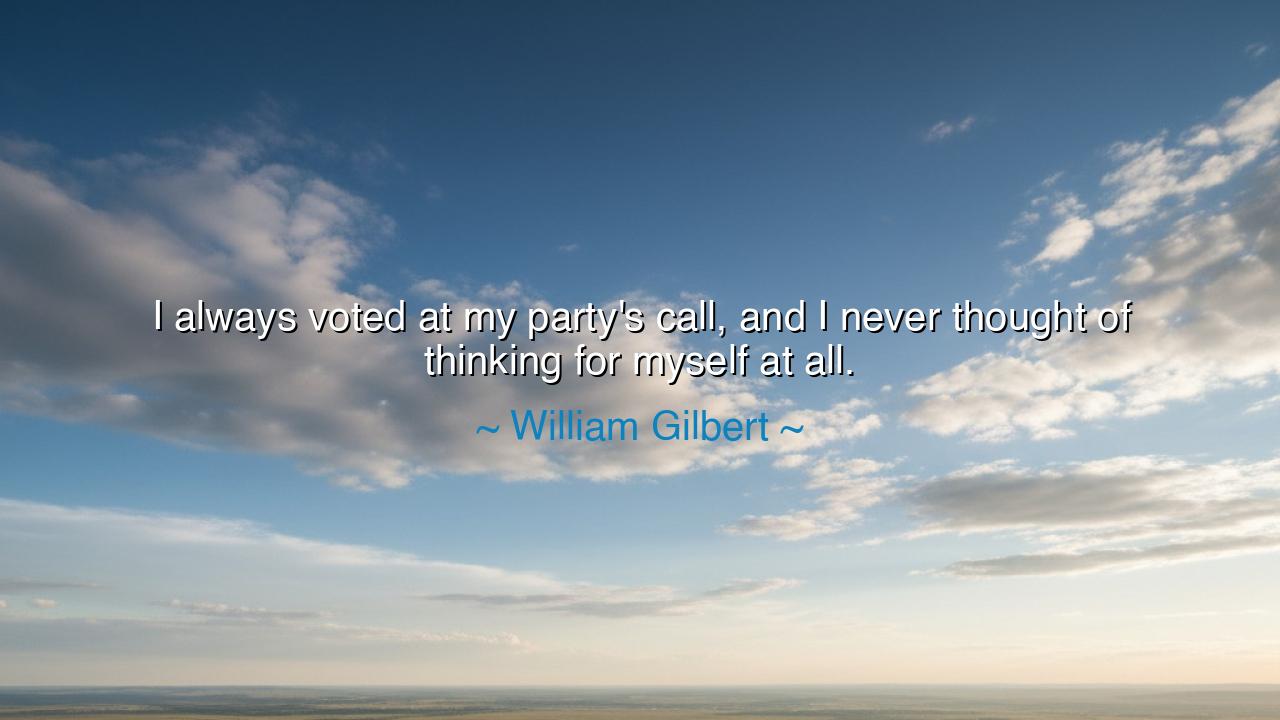
I always voted at my party's call, and I never thought of






The words of William Gilbert — “I always voted at my party’s call, and I never thought of thinking for myself at all.” — were penned in satire, yet they reveal a truth that echoes across centuries. Gilbert, the dramatist famed for his wit alongside Arthur Sullivan, placed these words in the mouth of a character in H.M.S. Pinafore (1878). They were meant as mockery of blind loyalty, a lampoon of those who give their conscience not to truth but to the machinery of party. Yet what was sung for humor carries within it a timeless warning.
The meaning is both sharp and sorrowful. To vote always at a party’s call is to surrender one’s judgment, to exchange the freedom of thought for the comfort of obedience. To “never think for oneself” is to betray the very purpose of democracy, where the citizen is called not merely to follow, but to discern, to weigh, and to choose. Gilbert’s satire unmasks the danger: that when individuals forsake independent thought, party becomes idol, and truth is lost in the noise of allegiance.
History bears many witnesses to this folly. In the days of the Whigs and Tories in Britain, or the Democrats and Republicans in America, countless men and women cast their ballots not from conviction, but from habit, loyalty, or pressure. Consider the debates over slavery in 19th-century America, where many legislators, bound by party, defended injustice rather than confront the moral truth. Their refusal to think for themselves prolonged suffering and nearly tore the nation apart. Here Gilbert’s jest finds tragic embodiment.
Yet, satire often carries hope within its sting. By ridiculing blind obedience, Gilbert was urging his audience toward self-awareness. His playful words carry a serious call: to awaken from slumber, to cast aside the chains of party, and to reclaim the dignity of thought. For the health of a nation does not rest in the commands of leaders alone, but in the courage of its people to act as free minds rather than echoing voices.
Let this lesson be remembered: thinking for oneself is not rebellion, but duty. To follow blindly is to weaken both self and state; to question, to reflect, and to choose with conscience is to strengthen the very foundation of freedom. Gilbert’s satire, though sung in laughter, remains a warning to every age: beware the man who glories in obedience, for he has traded away the noblest gift of all — the power to think.






KLnguyen khanh ly
I find this quote both amusing and unsettling. It highlights the potential dangers of political herd mentality. Is it possible that political parties sometimes encourage a culture where independent thinking is discouraged? While loyalty to a party is important, shouldn’t individuals be more mindful of their personal convictions when voting? This quote makes me think about the balance between loyalty and critical thinking in democratic processes.
MYTRUONG THI MAI YEN
The idea that someone votes based on party loyalty without considering their own views raises an important question about the role of personal responsibility in voting. How much should a person align with their party, and how much should they think for themselves? In a way, this could be seen as a form of political apathy, where people let the party do the thinking for them. But is there a time when such behavior might be excusable, especially if the party represents one's values?
HPNguyen Hong Phuong
This quote seems to touch on the concept of political conformity, where people follow party lines without questioning them. Could this be seen as a reflection of the times or as a warning about losing personal autonomy in politics? Is it ever okay to just vote along party lines without reflecting on the issues? It might be worth considering whether such unthinking loyalty is detrimental in the long run, both for individuals and society.
BB.Huy
This quote feels like a critique of blind party loyalty. Is it really healthy to follow a party's agenda without considering one's own thoughts or beliefs? It seems to suggest a lack of independent thinking, which can be dangerous, especially in a democratic system. Shouldn’t individuals critically evaluate the issues rather than just vote according to their party? I think it's important to have a balance between party loyalty and independent judgment.